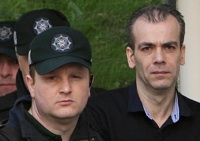
Following intense controversy over his continued detention without charge, Colin Duffy was brought to court this [Friday] morning and formally charged in connection with the ‘Real IRA’ attack on Massereene British Army base earlier this month.
Two other prominent republicans from Bellaghy in south County Derry were among six detainees released from custody on Wednesday after a judge ruled they had been unlawfully detained. Mr Duffy was led to the gates of the PSNI base and “rearrested” before being charged last night.
Two British soldiers died in the gun assault at the British Army base in County Antrim on March 9. Less than 48 hours later, a member of the PSNI died in a subsequent attack by the Continuity IRA in Craigavon, County Armagh. The combined attacks provoked a frenzied response from both the mainstream media and the political establishment in the North of Ireland.
The PSNI admitted at Wednesday’s hearing that its arrests had taken place in the absence of evidence and that forensic tests had failed to connect any of the three men with the attack.
Only the arrest of a fourth man for the Massereene attack -- later also released without charge -- was said by the PSNI to have been based on both “evidence and information”.
Despite the lack of evidence and the completion of their questioning, the PSNI controversially sought and secured extensions to their detention on two occasions under new special legislation.
Mr Duffy and two other detainees went without food since Sunday this week in a hunger protest.
On Monday lawyers for the four, as well as two others being held over the Continuity IRA attack in Craigavon, began a legal challenge against their continued detention. Mr Duffy was unexpectedly brought to the Belfast High Court for the hearing.
Monica McWilliams, head of the Human Rights Commission, later visited the six at the interrogation centre and expressed concern at the conditions in which they were being held.
On Wednesday morning, the most senior judge in the North, Chief Justice Brian Kerr, ruled that their continued detention was illegal.
The PSNI consented to release the remaining detainees, with the exception of Mr Duffy.
Late last [Thursday] night, as legal representatives prepared to launch another court challenge against his detention and growing human rights concerns, Mr Duffy was finally charged with the Massereene attack.
The PSNI today claimed to have found new forensic evidence against him.
The Lurgan man has endured a long history of harassment, false arrest and false imprisonment at the hands of the PSNI (formerly RUC). He was the most prominent client of human rights lawyer Rosemary Nelson. Mrs Nelson was killed in a suspected case of collusion between the RUC and unionist paramilitaries ten years ago.
HISTORIC RULING
As pressure grew for the detainees to be charged or released at the weekend, former Sinn Féin councillor Brendan McConville and a 17-year-old boy were charged on Monday in connection with the Craigavon attack.
Mr McConville, who left Sinn Féin in 1997, had endured the longest period of detention without charge in British legal history since the repressive policy of internment in the seventies.
After securing a historic court ruling on Wednesday, the law firm which represented four of the detainees said it would lead to a complete review into the way the PSNI may try to justify lengthy detention periods.
“It is a seminal judgment and has far-reaching implications for the conduct of serious police investigations throughout the UK,” according to the statement from Kevin R Winters.
But there was also concerns and anger at the manner in which the PSNI sought to evade the judge’s ruling in Mr Duffy’s case.
Mr Duffy’s family issued a statement accusing the PSNI of waging a “vendetta” against him. The force had shown complete disregard for the justice system and for the European Convention of Human Rights,” they said.
“It is the view of his family that the PSNI’s motivations are based upon sheer vindictiveness and also as a reaction to the media frenzy.”
Sinn Féin described Mr Duffy’s rearrest as “a clear abuse of the court’s judgment” which was short of “human rights best practice”.
The Republican Network for Unity, an umbrella republican group, called for anyone sitting on a district policing partnership to quit immediately.
It said the treatment of Mr Duffy was “as much an assault upon the due process of law as it is upon the human rights of all who live within the six-county statelet”.
eirigi spokesperson Breandan Mac Cionnaith said the PSNI had acted “in defiance of even its own courts”. He said Mr Duffy’s rearrest had been “farcical” and proved that the British police force was “accountable to no one”.
“In this particular case we now appear to be following a worrying pattern,” he said.
“This pattern, which began in the early 1990s, includes instances of attempted murder and actual murder by suspected state forces, constant harassment and miscarriages of justice.
“What began as a trial by media and establishment politicians and developed into a PSNI-led witch hunt has been ruled out of order by a British court. This is an indictment on all those involved in this affair.”
He said that the PSNI was treating the Six Counties as “a colony” to be kept under control through the use of interrogation centres and illegal detentions.
“Those within the nationalist and republican community who promised acceptable and accountable British policing in Ireland must now concede that their plans lie in tatters,” he concluded.
![[Irish Republican News]](https://republican-news.org/graphics/title_gifs/rn.gif)
![[Irish Republican News]](https://republican-news.org/graphics/title_gifs/harp.gif)

